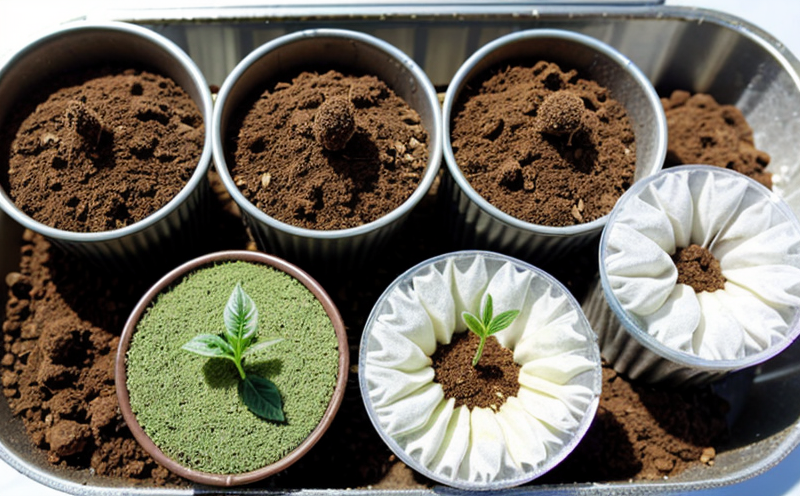Seed Lot Sampling & Quality Testing
The integrity of agricultural and forestry production begins with the quality of seeds used. Ensuring that seed lots meet specific criteria is critical for maintaining crop health, yield consistency, and overall productivity in agriculture and forestry sectors. At our laboratory, we specialize in providing comprehensive services for seed lot sampling and quality testing to ensure compliance with international standards.
Our process begins with meticulous sampling of the seed lot. This involves selecting representative samples from various parts of the lot to ensure that any potential issues or discrepancies are captured early on. The samples collected undergo rigorous analysis using advanced scientific techniques, including moisture content determination, germination testing, and purity assessment. These tests help identify impurities, such as weed seeds, inert materials, and other contaminants.
Germination testing is a crucial aspect of this service. It involves placing the seed samples in controlled environments to observe how many seeds will sprout under standard conditions. This helps determine the viability of the seeds, which directly impacts their ability to grow into healthy plants. Compliance with international standards like ISO 3632-1 and ASTM D4580 ensures that our testing methods are consistent and reliable.
Once the initial tests are complete, we provide detailed reports outlining all findings. These reports serve as valuable tools for quality managers, compliance officers, R&D engineers, and procurement teams to make informed decisions about seed acceptance or rejection. The data from these tests can also be used to improve future planting strategies by identifying which seeds perform best under specific conditions.
The importance of accurate seed lot sampling cannot be overstated. Poorly sampled lots may lead to suboptimal results during germination testing, potentially causing significant financial losses due to wasted resources and time. By adhering strictly to established protocols and using state-of-the-art equipment, we aim to eliminate such risks.
To further illustrate the significance of this service, consider a case study involving a major seed supplier who was facing challenges with inconsistent germination rates across different batches. After implementing our seed lot sampling and quality testing protocol, they were able to pinpoint exactly which batches had issues and why. This allowed them not only to resolve immediate problems but also to implement long-term solutions aimed at improving overall product quality.
In addition to these core services, we offer additional support such as advice on optimal storage conditions for seeds based on their chemical composition or genetic makeup. Understanding how environmental factors like temperature, humidity, and light affect seed longevity is essential for maintaining high-quality stocks over time.
Applied Standards
To ensure the highest level of accuracy and reliability in our seed lot sampling and quality testing services, we follow internationally recognized standards such as ISO 3632-1 for germination tests on seeds and ASTM D4580 for moisture content determination. By adhering to these guidelines, we guarantee that every aspect of your seed lots is evaluated according to the most stringent criteria available.
ISO 3632-1 specifies procedures for testing germination rates in seeds, which are essential indicators of viability and healthiness. It covers various phases from initial conditioning through final evaluation after exposure to controlled environmental conditions. This standard ensures that all tests conducted by our laboratory comply with internationally accepted practices.
ASTM D4580 provides specific instructions for measuring moisture content in plant materials, including seeds. Proper measurement of moisture content is vital because it affects several properties of the seed such as dormancy period, vigor, and shelf life. Adhering to this standard helps maintain consistent quality throughout storage periods.
Benefits
- Enhanced Crop Quality: Identifying and eliminating poor-quality seeds early on ensures that only healthy plants are grown from the seed lots, leading to better crop yields.
- Informed Decision-Making: Detailed reports provide valuable insights into the condition of each batch of seeds, allowing stakeholders to make well-informed decisions regarding acceptance or rejection.
- Cost Efficiency: Early detection of problematic seed lots prevents unnecessary expenses associated with failed plantings and subsequent replacements.
- Compliance Assurance: Following internationally recognized standards ensures that all tests meet regulatory requirements, reducing the risk of non-compliance penalties.
Customer Impact and Satisfaction
- Increased Productivity: By ensuring only high-quality seeds are used in cultivation processes, customers experience increased productivity levels across their farms or plantations.
- Promoted Sustainability: This service supports sustainable agricultural practices by minimizing waste and maximizing resource utilization through the use of efficient testing methods.
- Improved Reputation: Providing reliable data on seed quality enhances the reputation of both suppliers and end-users, fostering trust within industry networks.
- Enhanced Customer Satisfaction: Accurate and timely feedback about seed conditions helps customers feel confident in their choices, thereby boosting overall satisfaction levels.





